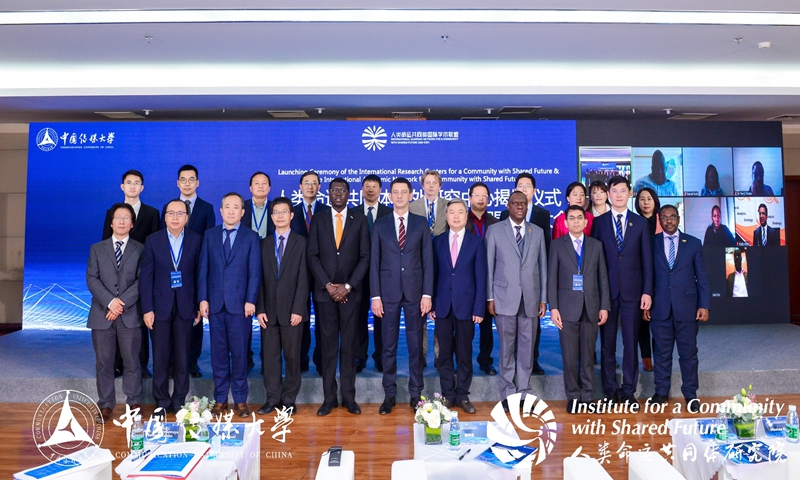Global academic cooperation guided by a community with shared future provides a 'stabilizer' for the changing world: officials and scholars
By Lin Xiaoyi Source: Global Times Published: 2020/10/25 23:24:53

Participants of the International Research Centers for a Community with Shared Future & the International Academic Network for a Community with Shared Future Photo: Institute for a Community with Shared Future of Communication University of China
Global academic cooperation under the framework of a community with a shared future will provide a "stabilizer" for the changing world, promote the development of multilateralism and lead countries to use the power of science to jointly defuse more obstacles to global governance posed by unilateralism, hegemony and imperialism, said officials and scholars at the lunching ceremony of the International Research Centers for a Community with Shared Future & the International Academic Network for a Community with Shared Future (IAN-CSF) on Friday at Communication University of China in Beijing.
At the ceremony, foreign ambassadors, officials, and scholars appreciated China for putting forward the initiative of a community with shared future for humanity and actively undertaking international responsibilities. They believed that meeting challenges such as economic downturn, terrorism, climate change and epidemic diseases made the idea of a community with a shared future a reality.
However, it is also noted that some countries are pursuing conservatism and anti-globalization, which is not conducive to the resolution of crises, but makes the international community more divided.
Farooq Ahmed, Pakistani envoy to China said that the community with shared future is an inevitable topic for the whole of humanity. Globalization makes what happens in one part also affect other parts of the world. Unilateralism, hegemony and imperialism do not benefit people and have no future and the only way forward is cooperation and sharing.
"We are working to counter populism, extremism, nationalism and hegemony, and people who are using every single crisis that humanity is facing to make our world more extreme, more nationalistic, and more hegemonic," said Hakima El Haité, former Minister of Environment of Morocco.
Hakima noted that some populists do not believe in globalization and the idea of community with shared future for mankind, but they still have some victories and are increasing inequality and instability in the world.
In addition to believing that multilateralism is the key to ensuring world security and peace, many participants equally stressed the power of science.
"Not only is the COVID-19 pandemic on our horizon, many new "political viruses" are also causing concern. We have seen that some countries don't respect science and politicize epidemic prevention and control, showing that we have to not only face the challenge of COVID-19, but also counter the spread of rumors, and more importantly, combating the extremely harmful political bias," said Chen Xulong, researcher of the China Institute of International Studies.
Chen called for standing on the side of international fairness and justice, taking up the power of science and promoting academic cooperation with the support of people from all over the world.
Mbelwa Kairuki, Ambassador of Tanzania to China also expressed the hope of ending the spread of fake news through academic exchanges, using academic achievements to dispel rumors.
Research and academic centers of seven countries are brought together under the partnership of the international academic network, including Germany, South Korea, Pakistan, Malaysia, Ethiopia, and Tanzania.
Directors of the partner international institutions also addressed the ceremony, stressing the importance of collaboration, cooperation, and interconnection in the academic domain to work collectively towards making the world a progressive and prosperous place, as well as improving the overall quality of research in the academic field.
Posted in: SOCIETY